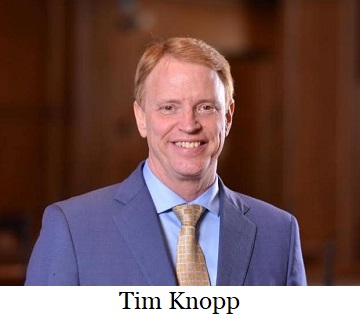HB 4002 has been signed by Governor Kotek
Oregon Governor Kotek signed into law
HB 4002, a bill reversing much of Oregon’s drug decriminalization experiment in response to a deadly addiction crisis plaguing major cities, suburban neighborhoods, and rural communities across the state. The bipartisan proposal cleared the Oregon Senate with overwhelming support exactly one month ago.
A key priority for the Senate Republican Caucus last session was to address drug addiction, homelessness, and crime. Recriminalizing possession of small amounts of hard drugs was at the top of the list. It is widely supported by Oregon voters.
Senate Republican Leader Tim Knopp (R-Bend) responded to the Governor's signing: “Now that the Governor has given the recriminalization bill her stamp of approval, we can finally end the chapter on Oregon’s experiment with decriminalizing hard drugs. HB 4002 is not a perfect solution; legislators will undoubtedly have much more work to do in upcoming sessions. But it sets a standard for how the state should approach the drug addiction crisis: by empowering law enforcement and our behavioral health systems to work together to help Oregonians struggling with chronic addiction seek life-saving treatment.”
House Republican Leader Jeff Helfrich (R-Hood River) offered the following statement: "Republicans stood united and forced Democrats to do what Oregonians demanded: recriminalize drugs. Make no mistake, this bill is not enough to undo the disaster of Measure 110. House Republicans are ready to continue the work we started and bring real change to Salem in the next session."
Representative Kevin Mannix (R-Keizer/North Salem) serves on the Joint Committee on Addiction and Community Safety. He comments, "I am delighted that the Governor has now signed House Bill 4002. This was a major bipartisan effort to get Oregon back on track in dealing with hard drugs and their terrible impact on our communities. We have now made it clear that possession of such drugs is a crime, but we have coupled this with comprehensive treatment approaches to help people end their addictions. We will all need to work together to build up our treatment programs and to support law enforcement as they deal with the new unclassified misdemeanor of possession of hard drugs. We have much more to do. I will be presenting proposals to our Joint Committee on Addiction and Community Safety. These include identification and expansion of treatment facilities, recruitment of treatment providers, and support for law enforcement activities."
A D V E R T I S E M E N T

A D V E R T I S E M E N T
Kelsi Manley, MD, FACP; and Jenny Silberger, MD, FACP; testified on behalf of the Oregon Chapter of the American College of Physicians. "We commend the legislature's efforts to recognize SUD as a public health issue and improve access to treatment. Substance use disorders are chronic medical conditions, akin to other chronic illnesses, and acknowledging them as such is vital for crafting effective, evidence-based solutions. As healthcare workers, we witness the suffering that addiction causes, but we also witness how treatment can result in remission, improved quality of life, and recovery for our patients and communities."
Concerns are in recriminalizing drugs that may inflict more government harm and violence on Black and brown communities. HB 4002 calls for the Oregon Criminal Justice Commission to conduct a study to determine best practices for deflection programs and make recommendations for funding, for standards and best practices for the state. "Deflection program" is defined to mean a collaborative program between law enforcement agencies and behavioral health entities that assists individuals who may have substance use disorder, another behavioral health disorder or co-occurring disorders, to create community-based pathways to treatment, recovery support services, housing, case management or other services.
Testimony focused on getting to the source and not exasperate the mistakes of liberal policies. "Drug dealing of any amount of hard drugs needs to be at the very least a class B felony. We need to go back to a zero tolerance approach with no more of these social experiments in the name of humanity and reductions of incarcerated populations. End this travesty now. No more studying bad choices of the Oregon government. The time for action is now."
--Staff Reports| Post Date: 2024-04-03 11:17:29 | Last Update: 2024-04-04 13:57:25 |







